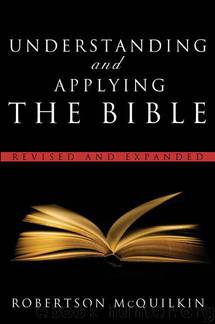Understanding and Applying the Bible: Revised and Expanded by McQuilkin Robertson

Author:McQuilkin, Robertson
Language: eng
Format: epub
Publisher: Moody Publishers
Published: 2009-06-23T16:00:00+00:00
Figures of association. Figures of association are different from figures of comparison in the following way: In figures of comparison unlike things are compared, whereas in figures of association the name of one object or concept is used for that of another to which it is related. That association is called metonomy. Christ gave us an example of the figure of association when He said, "Whoever swears by heaven, swears both by the throne of God and by Him who sits upon it" (Matt. 23:22). The Pharisee would not take God's name in vain, but he chose to use the place associated with God and swear by heaven. He used a figure of association to evade the requirement. But Christ disallowed that, pointing out that a figurative expression of association means the same thing as the object or concept for which it stands.
"All Jerusalem went out to be baptized of John" does not mean that the city itself moved, but rather, the people who lived in the city and were associated with the name Jerusalem went out to be baptized by John.
Sometimes the figure of association is synecdoche, in which part of something is spoken of as if it were the whole thing; or the whole thing may stand for only part of it. Often "the law" referred to the entire Old Testament. How could that be? The commandments were given by Moses, the lawgiver, who wrote the first five books of the Old Testament (the Pentateuch). Hence, both Moses and the law are associated with the Pentateuch, and are often used as a substitute or "shorthand" for that part of Scripture. The Pentateuch, in turn, is sometimes associated with the whole Old Testament, as the first section of it. So "the law," as a figure of association, came to be used either for the Pentateuch or for the entire Old Testament. The context must determine which was intended.
Figures of humanization. The Bible often will take a characteristic of people and attribute it to God to form an anthropomorphism, or to an object to form a personification. When it is said that God "stretched out His arm," that the "trees clapped their hands," or that the "hills skipped," we might call those figures of humanization.
In a sense, this kind of association is an implied comparison and might be treated as a figure of comparison, as described earlier. However, there is benefit in isolating this particular kind of figure in order to interpret certain passages of Scripture. For example, in the early chapters of Proverbs wisdom is spoken of as if it were a human being. Does that make the entire section messianic, as some hold? What was the author's purpose in personifying wisdom? Consider the way Scripture speaks of God, using physical and human characteristics. C. S. Lewis explained this graphically:
God is basic Fact or Actuality, the source of all other facthood. At all costs therefore He must not be thought of as a featureless generality. If He exists at
Download
This site does not store any files on its server. We only index and link to content provided by other sites. Please contact the content providers to delete copyright contents if any and email us, we'll remove relevant links or contents immediately.
| Exegesis & Hermeneutics | New Testament |
| Old Testament |
The Five People You Meet in Heaven by Mitch Albom(3544)
The Secret Power of Speaking God's Word by Joyce Meyer(3138)
Real Sex by Lauren F. Winner(3000)
Name Book, The: Over 10,000 Names--Their Meanings, Origins, and Spiritual Significance by Astoria Dorothy(2962)
The Holy Spirit by Billy Graham(2932)
0041152001443424520 .pdf by Unknown(2832)
How The Mind Works by Steven Pinker(2801)
ESV Study Bible by Crossway(2768)
Ancient Worlds by Michael Scott(2659)
Churchill by Paul Johnson(2564)
The Meaning of the Library by unknow(2552)
The ESV Study Bible by Crossway Bibles(2543)
The Gnostic Gospels by Pagels Elaine(2515)
MOSES THE EGYPTIAN by Jan Assmann(2406)
Jesus by Paul Johnson(2347)
City of Stairs by Robert Jackson Bennett(2335)
The Complete Dead Sea Scrolls in English (7th Edition) (Penguin Classics) by Geza Vermes(2268)
The Nativity by Geza Vermes(2217)
Ancient Near Eastern Thought and the Old Testament by John H. Walton(2211)
